| CREATING ART: GRAFFITI AND STREET ART |
 |
| When we think of art, we usually imagine the pieces hanging on gallery walls or in the hallways of fancy office buildings and hotels. Or we picture famous sculptures like Michelangelo's David or Rodin's The Thinker, on display in the most prominent museums around the world.
But "art" isn't limited to those pieces we can buy of the shelf and hang or otherwise show in our living room. In recent years, public art has been gaining in popularity, with established artists of various media commissioned to create beautiful works that will not be preserved forever in a humidity-controlled archive. Rather, these pieces are displayed out in the open - and often created right there, as well. Many of these projects get as much attention as gallery artworks - think of the giant reflective "bean" in Chicago, or even Mount Rushmore and the Statue of Liberty.
Then there is the public art that is not commissioned. Instead of classifying these works as "art", most people write it off as graffiti. And while some graffiti is inappropriate or damaging to property, much of it is beautiful in its own right, and showcases the talent of the - often anonymous - artist.
Outdoor paintings that are commissioned, or that have reached a level of public acceptance, are given a new designation: street art. Adding color and interest to bland plaster walls and concrete skate parks, this widespread style has been embraced as an art genre of its own.
|
SUMMARY
- A Brief History of Street Art
- Street Art Styles
- Tags
- Text Art
- Stencil
- Collage
- Yarn Bombing
- Street Artists: Banksy, David Choe, and Moose are three well-known street artists with unique styles.
- "Legitimate" Street Art: Some well-known examples of commissioned street art in the US and UK.
|
| BRIEF HISTORY OF STREET ART
|
 |
|
Mankind has been drawing on walls since the beginning of time. Words were found scrawled on the walls of the buried city of Pompeii, and cave paintings date back 40,000 years.
Much as it is today, graffiti was society's way of expressing themselves - sharing their stories, announcing their successes or defeats, and voicing their displeasure with the current regime. Ancient wall painting artists have been identified by their unique signature much like contemporary graffiti artists "tag" walls and artworks.
One form of street art that has always been relatively accepted is mural artwork. Frescos like Raphael's School of Athens and ceiling paintings like Michelangelo's Sistine Chapel were commissioned (requested and paid for) in the Renaissance period and earlier. Since the early 1900s, artists have been commissioned to create full-blown works of political and social art on both indoor and outdoor walls, such as Diego Rivera's ceiling piece at the National Palace in Mexico City.
The style we recognize as "graffiti" today is thought to have begun around the 60s or 70s, on the heels of hip hop and the Pop Art movement led by Andy Warhol. It fit well among these signs of social change in that it denied categorization and commercialism, and drew on images and ideas from popular culture. The conversation started by graffiti regarding what is private and what is public - what is vandalism and what is art - has carried on to this day without definite resolution.
Though some street artists may use oil-based paints or other media, the most common graffiti media is spray paint. This is largely because the wide range of the stream allows the artwork to be completely quickly. Over the years, many artists have become as adept at their spray paint technique as any traditional artist in oil, acrylic, or watercolor.
Finally recognized as a significant area of academic study for what it can teach us about the socio-political mindset of specific middle and lower class groups during periods of upheaval and unrest, graffiti is reaching a level of acceptability previously unseen. Some street artists, like England's Banksy and California's David Choe, have become renowned figures at least in part for their contributions to public art.
Commissioned street art (beyond traditional murals) is also growing in popularity, with anyone from painters to architects hired to create full-wall graffiti-esque paintings, sculptures, and usable art in public spaces. Social science has shown the positive effect art has on general well being, so it's no surprise many municipalities are choosing to offer more and more chances to enjoy it in the public sphere.
|
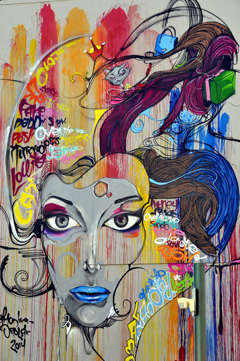
Wall graffiti, location unknown
|
| STREET ART STYLES
|
 |
|
Graffiti encompasses many unique styles and genres of art. Some artists create very traditional pieces, using the nontraditional location to set their work apart from the classical masters. Others use new or appropriated styles to make their mark or their message in the public forum.
TAGS
The most common graffiti style in contemporary street art, a tag is an artist's signature. Though tags do accompany larger artworks, used in the same way a traditional artist would sign their work, generally in the lower corner, tags are also used independently of other art. A graffiti artist tags buildings in a form of self-promotion or advertising, and a certain sign can be spotted all over a city, or in numerous locations within a neighbourhood.
Tags are generally difficult to read and usually utilize the artist's pseudonym. While general passersby may be able to identify specific artists by their tags, they are more commonly intended to make the underground graffiti community aware of the artist's presence and talent.
TEXT ART
Similar to, and occasionally indistinguishable from, tags, text art is a popular graffiti style that creates colorful, often large decorative pieces out of words and letters. Sometimes so stylized the meaning is lost to all but the artist, text art utilizes typography to make a statement or just to add a bit of color.
In addition to alley walls, text art is often found on the sides of train cars, like the image to the right. Some of these very stylized, burst-like images are referred to as "wildstyle" graffiti.
STENCIL
Another street art style that has become quite popular in recent years is stencilling. One of the draws to this genre is the speed at which the artist can create their art and run off before anyone sees them. The artist creates the stencil, often quite large, in a separate location, and affixes it temporarily to the wall. Spray paint is applied over the stencil, leaving the artwork in place once it has been removed.
Without a doubt, the most famous graffiti artist to use stencils is the London-based Banksy.
COLLAGE
Inspired by urban event poster displays, some graffiti artists use paper materials and glue or transparent paint to make their mark. Much like stencils, this style allows the artist to prepare the bulk of the work elsewhere and only remain in the display location long enough to hang the piece.
A layer of glue is first applied to the wall. The paper cutout image is put up, and another layer of glue is placed overtop. Depending on the adhesive, and amount of adhesive, used, collage graffiti can be temporary or last as long as painted street art.
YARN BOMBING
An entirely different style of graffiti, yarn bombing - also known as guerrilla knitting - involves covering railings, street posts and other urban fixtures with knitted sleeves. Started by Magda Sayeg in 2005, the movement began as a way to personalize and "warm up" the cold, sterile streets of many urban centers.
Again like stencils or collage, much of the yarn bomber's work can be done elsewhere. A pre-made, scarf-like sheet of knitted material is simply wrapped around tree trunks, poles, or statues, and sewn into a tube. Alternately, strings of knitted material can be strung along fences, through trees, or made to entirely cover objects.
Because it can easily be cut away, yarn bombing is considered a temporary form of street art, though it is often still considered vandalism.
|
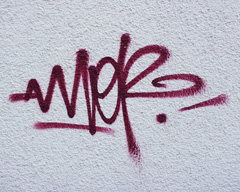
A "tag" on a public wall
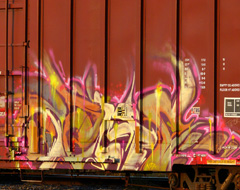
A train car with graffiti typography
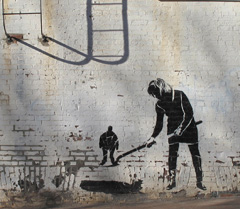
Stenciled graffiti in Asheville, NC
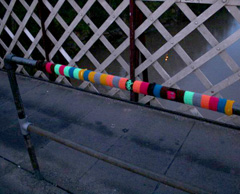
Yarn bombed railing in Bristol, England
|
| STREET ARTISTS
|
 |
BANKSY
Using intricate stencils, this satirical street artist makes public statements about everything from police brutality to environmentalism. Believed to have begun in the early 1990s, the talented artist has managed to maintain his anonymity throughout numerous exhibits and even documentary films. This fact has heightened his popularity, but his art is impressive in itself.
From escape scenes on dividing walls in Israel and Bethlehem to a nude man hanging out a "window" in Bristol (believed to be his hometown), Banksy has left his personal brand of art in most major cities in the world. Expanding from outdoor buildings to gallery walls, his work has been displayed in the British Museum, MoMA, Brooklyn Museum and more.
Primary style: Stencil
DAVID CHOE
Famous for being paid for a Facebook mural in company stocks (which he sold to become a millionaire), David Choe is far from anonymous. He works on movie sets, as a graphic designer, and is the creator of a recognizable portrait painting of the President of the United States. His street art is found in his native Los Angeles, as well as Japan, France, and England.
Primary style: Painting
MOOSE
Another English native, this street artist is known for his unique brand of graffiti that uses cleaning tools instead of paint. With special cleaners, he scrubs away the dirt from surfaces, creating the image in the cleaned sections. More temporary than traditional graffiti, the images fade over time as the dirt begins to build up again, or if the entire wall is cleaned.
This graffiti style has been adopted by advertising agencies and often accompanies an environmentally-friendly message.
Primary style: "reverse" graffiti
|
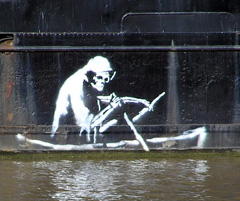
Banksy graffiti on a boat in Bristol, England
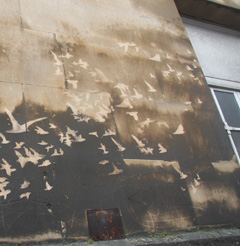
Moose's reverse graffiti in Bristol, England
|
| "LEGITIMATE" STREET ART
|
 |
|
Much of the street art discussed above is done with a degree of secrecy, in the dead of night or in darkened alleyways where people rarely go. To completely separate this art style from the more accepted, paid artworks present in most cities is to do a disservice to graffiti art in general. While some graffiti artists turn away from the commercialism inherent in mainstream art, others graduate from anonymity to become highly recognized and sought after artists.
Completely legal, commissioned examples of sculptural street art:
PIGS IN BATH, ENGLAND
In 2008, 104 pig sculptures, painted and otherwise decorated by local artists, were displayed around the city of Bath, in England. Called "King Bladud's Pigs" after the legendary royal who is said to have founded the city, the sculptures were auctioned off at the end of the summer to fund a local restoration project.
BLUE BEAR, COLORADO
Peering through a window in the Colorado Convention Center is a massive, forty-foot-tall blue bear. The sculpture, created by Lawrence Argent, created the piece to "embrace [the building's] uniqueness of form and space." The bear is arranged peeking into the building to represent local curiosity for what is happening inside the center at any given time, and was prompted by a photograph the artist saw of a black bear looking into a window.
CLOUD GATE, CHICAGO
One of the best known pieces of street art in the U.S., Cloud Gate is a bean-shaped, stainless steel sculpture that sits in the middle of Millennium Park. Artist Anish Kapoor created the sculpture to reflect a distorted view of Chicago's skyline, and allow visitors to walk through the 12-foot arch beneath.
ANGEL OF THE NORTH, ENGLAND
Located atop a hill in Gateshead, England, the Angel of the North is a monolithic steel sculpture of an angel with a wingspan of 177 feet. When viewed from passing cars on the highway, the angel appears to rotate. The sculpture, designed by Antony Gormley, has multiple meanings including a nod to the transition from the industrial to the "information age."
|
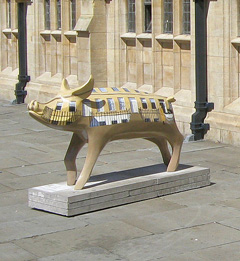
One of Bath's 104 pig sculptures
|
| STREET ART & REPRODUCTIONS
|
 |
| With new graffiti popping up every day, it's safe to assume street art is here to stay. Whether you think it is vandalism or beautiful art, there's no denying it adds color and interest to the often bland and industrial urban centers where it is placed.
If you are interested in checking out the street art in your own city, or a city you're planning to visit, do a web search for "street art walking tour." Many large cities have dedicated art tours that proudly showcase their own original public art.
Do you have your own awesome graffiti photographs? At KeenART Media, we can create canvas or fine art prints from any digital image.
Because graffiti and street art are most often found on large walls, or are three dimensional, scanning is rarely an option for reproduction of this art. It is difficult to take a photograph of only a graffiti artwork, without the street, passersby, trees, or cars appearing in the image. However, often it is these innately urban objects and aspects, unavoidably included in the image, that give the reproduction the perfect amount of "grunge" so well suited to the subject matter.
If you do have a graffiti-esque original painting or drawing on a transportable substrate, we also offer artwork scanning.
If you want some street art for your own wall, check out our Graffiti Gallery for a selection of prints that will give your living room an urban appeal.
|


|

|
Custom-Made Picture Framing, Custom Stretcher Bar Frames
, Custom Artist Canvas, Custom Canvas Stretching, Canvas transfer & Dry Mounting Services
A division of USA On Canvas -
|
|
© 2002-2026 - KeenART Media Ltd.
|
|
| |
|

